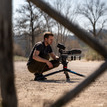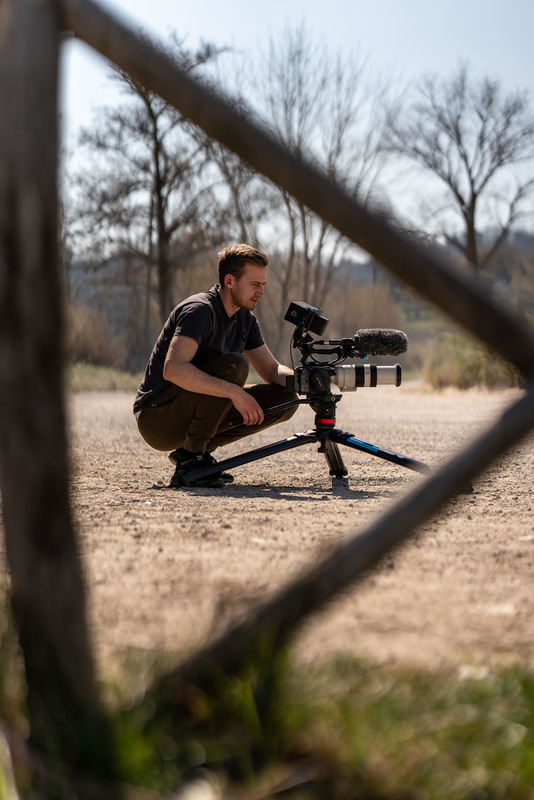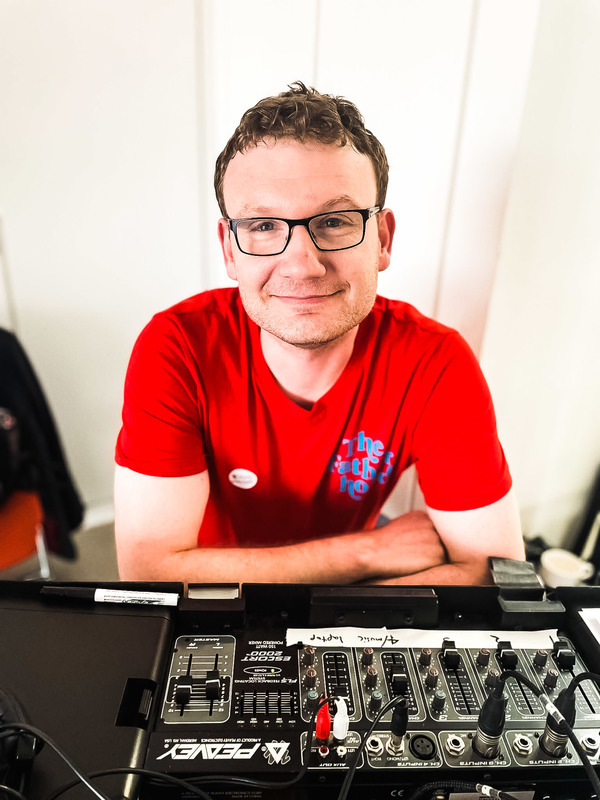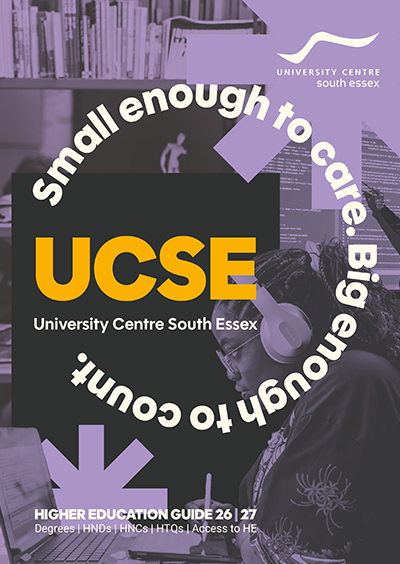Level 6
Film & Television Production BA (Hons)
| Duration | Age Group | Study | Start | Cost | Available Locations |
|---|---|---|---|---|---|
| 3 YEARS | ADULT | FULL TIME |
15/09/2026 |
£9,535 per year * | Southend Campus |
| Duration | Age Group | Study | Start | Cost | Available Locations |
|---|---|---|---|---|---|
| 3 YEARS | ADULT | FULL TIME |
15/09/2026 |
£9,535 per year * | Southend Campus |
Share On
Overview
Course code: P320
This course is validated by the University of the Arts London (UAL)
There’s never been a more exciting time to be getting involved with Film and TV in the UK. There are areas of huge expansion in production, particularly across the South East, and with this expansion comes a huge amount of opportunity – especially at the Backstage Centre in Purfleet, with which we are directly associated.
This course is a combination of theory and practical work across all areas of film and TV production, focussing on practical units in a modern television studio, location filming, sound & vision, scriptwriting and film production management. The course offers more individual attention than comparable courses, along with appearances by guest speakers and workshops from professional practitioners. A longer film project is available in year three, which is an exciting opportunity to collaborate with other students.
Entry Requirements
You will need a minimum of 64 UCAS points from one or more of the following:
- A Levels
- T Levels
- BTEC/UAL Extended Diploma
- Foundation Diploma in Art and Design (Level 3 or 4)
- Or equivalent EU/International qualifications, such as International Baccalaureate Diploma
- And English GCSE passes at grade 4 or above (grade A*-C)
This list is not exhaustive, other qualifications may be considered. Entry to this course will also be determined by the quality of your application, looking primarily at your portfolio/showreel of work, personal statement and reference.
Applicants who do not meet these course entry requirements may still be considered in exceptional cases. The course team will consider each application that demonstrates additional strengths and alternative evidence.
Course Structure
Year One units (Level 4)
- FTV 101 - Screenwriting
- FTV 102 - Theory as Practice
- FTV 103 - Sound
- FTV 104 - Lights! Camera! Action!
Year Two units (Level 5)
- FTV 201 - Post-Production Portfolio
- FTV 202 - Theory as Practice II
- FTV 203 - Moving Image Production
- FTV 204 - Social Media Impact
Year Three units (Level 6)
- FTV 301 - Directing Performance
- FTV 302 - Production Skillset
- FTV 303 - Research Proposal and Project
- FTV 304 - Final Project
Teaching & Learning
Contact hours: 13 hours per week. Plus Independent Study (suggested 30 hours per week)
Assessment & Feedback
All assessment on the BA (Hons) Film & TV for Production is via coursework; there are no exams.
You are taught through a combination of lectures, seminars and workshops, which enable you to discuss and develop your understanding of the disciplines associated with Film and Television Production.
You will use industry-standard hardware and software with access to various facilities including computer areas, including outside normal teaching hours. As more powerful and versatile cameras and film-making equipment become available our equipment is updated on a regular basis.
Coursework is assessed in a range of different ways in order to accommodate a variety of learning styles and aptitudes.
You will receive on-going feedback as part of your one-to-one sessions with your unit teachers. You will also receive summative feedback on all formal assessments undertaken by coursework. Feedback is intended to help you learn and you are encouraged to discuss it with your unit leader.
Feedback can be given in a range of different ways in order to accommodate a variety of learning styles and aptitudes including group critiques, recorded verbal feedback and written feedback.
Course Cost
Adult,
full_time:
£9,535 per year
Fees are per academic year for Home/UK students.
The following course-related costs are included in the fees:
- Guest speakers, visiting lecturers and industry focussed workshops will be included in your course over the three years.
- Third Year students will have the opportunity to showcase their final year work at the end of their studies. This may be a local, national or online platform. Event/exhibition costs will be covered by the Faculty of HE. In the past this has included the Southend Fringe Festival. Students will be responsible for any additional costs associated with the production of their personal project (ie: printing, materials).
- Optional additional workshops (in recent years these have included topics such as creative improvisation and stage pyrotechnic safety)
- Annual £20 of printing credit per year.
Additional course costs can be found here
What Next...
Graduating students leave with the ability to work in their own production teams to create short films. A number of recent graduates continue to create films for festivals and competitions; one of our third year students last year had a two week placement on BBC ONE’s live flagship THE ONE SHOW whilst on the course.
Students from each graduating cohort pursue successful careers in media companies including:
- BBC
- Channel 4
- Hat Trick
- Framestore
- Advertising agencies
- Regional film companies
- London & Hollywood post-production companies
Others continue their education at Master of Arts level and/or enter the teaching profession.
Success Stories...

South Essex College was perfect for me, especially when it came to Further Education

My name is Tony Waghorne, I am 26 years old, I studied Digital Animation and TV and Television Production and Screen Media at South Essex College from 2012 until 2017 and this is my story.
Before coming to study at South Essex College my background was, ‘I don’t know what I want to do’. I always had a heavy involvement in sport but sadly we can’t all be Premier League footballers. I’ve always been creative and when picking GCSE subjects an art teacher convinced me to take it and I developed an interest. I knew I had the ability to tell a story and it wasn’t until an open day at the college I stumbled across animation.
South Essex College was perfect for me, especially when it came to Further Education. I was a short 10 minute train journey away and to be honest I really didn’t want to move away to university. I knew I’d get distracted and not get the grade I was hoping for and eventually finish with.
The college prepared me for the workplace by putting me in real world situations. Strick deadlines, communicating with me like a colleague and not a pupil and not to mention the industry-level equipment.
I finished college with a Triple Distinction** and finished Further Education with a 1:1.
I was lucky enough to be accepted for an internship two weeks after completing further education at a digital sports agency in London. The company then employed me full-time and I stayed with them for a further 13 months. I then decided to try freelance work but I didn’t enjoy it. Luckily my previous employer took me back as senior videographer. Shortly after, a video agency in Westminster working for big fashion brands including Ted Baker and GHD employed me to be their sole videographer. My current employer contacted me regarding an opening and I’ve been with them for the best part of three years now.
I currently work as a senior videographer for Nash Tackle Limited. Nash Tackle are one of Europe’s leading carp fishing brands and in the media department we make anything from studio-shot product videos to feature-length documentaries shot all over Europe.
I do everything you’d expect in terms of shooting and acting as a lead on these shoots, but I also do a lot pre and post-shoot. This can be anything from booking hotels, contacting venues, assigning shoots/edits, watching edits and providing feedback and am just a general point of contact to the other videographers in the team. My manager is hoping to develop me into head of video in the not too distant future.
I think I would have been lost if I just left secondary school and attempted to get into this industry on my own. The college guided me into employment that I wanted to do and a career that I can strive in. I was able to change course easily and therefore find the right path for me through great mentorship and available opportunities.
At South Essex College I gained all of the basic skills I need to do my job. When I started further education I didn’t even know what aperture was and just five years later I’m leading crews of six on European shoots and being considered for a head of video role.
One of my most recent achievements was being flown out to Thailand to shoot. One of the many reasons I wanted to do this career was because of the travelling aspect and an experience like that is one many don’t get in their career.
The equipment at the college, especially the editing software's and machines are identical to what I use and what I always have used in the industry.
My time at the college helped 100% with my confidence. I’m not a confident person and there’s many moments you don’t look forward to when studying, presenting in front of a class for example, but these are the things that really help develop you and confidence is something that has been key to my career development.
My name is James Mitchell , I am 38 years old and I studied/at South Essex College from 2002-2007 and this is my story.
I studied MND Moving Image and then a degree BSC Television Production and Screen Theory. South Essex College was local to me, it had the course I wanted to study on and it allowed me to stay at home and work in a local theatre. Industry kit is evolving all the time but a basic understanding of the college kit was very helpful.
It was a great base unit to help you realise your career aspirations. My most memorable aspect of the college was the relationship with the lecturers. This gave me the confidence more than anything else. The chance to prove myself.
Since completing my course, I have worked in the West End in various theatres in Stratford Upon Avon for the Royal Shakespeare Company and in London at the National Theatre. I also worked at the college as a lecturer and technician for a couple of years, followed by working in Peterborough in shopping television and now work in Media City, Manchester for ITV News as a Lead Production Specialist.
My job entails looking after a team of fifteen production specialists and operating in television production roles. Which include head of lighting for ITV news, sound mixing, directing, floor managing, weather recordings etc. By working my way up, I was able to work as a trainee production specialist in 2013, to then being the Lead Production Specialist.
My proudest achievement so far, is winning two BAFTAs as part of a team, also winning Production Specialist of the year in 2017. I hope this will lead to my dream aspired role as an Operations Manager.
Are you an ex FE or HE student? Do you want your story to be told? Then contact us at marketing@southessex.ac.uk

When I joined Southend I met a great group of people and it gave me the confidence to speak more in classes
My name is Emily Burrett, I am 23 years old. I studied Media Television and Film production Level 3 Diploma, and Film and Television production BA (Hons) at South Essex Colleges Group (SECG) and University Centre South Essex (UCSE) from 2017 to 2023 and this is my story.
I had no background in media before I came to the college. I had some experience in working backstage but I used to film and edit YouTube videos in school which I think pushed me into wanting to study Film and Television production.
In both college and university I wanted to receive the highest marks possible, which I worked quite hard for. In college I got a distinction* distinction* distinction* and in university I got a First.
I viewed a few colleges and universities before I decided on Southend, after seeing their equipment and tutors I decided that was the right one for me. I also have a sibling who studied fashion at the college, and her experience there was really good.
My time at college and university allowed me to understand the industry a bit more. In college I got to understand industry standards and how different filming and editing styles worked. This then carried over in to university where I took these skilled I learned in college and developed them even more.
I think also having access to tutors who have worked in the industry or still were during my time was also really helpful as they shared their knowledge into different things.
Confidence really helps working in media. The confidence I gained really helps me pitch ideas to other producers and even presenters and celebrity guests that we get in.
I was quite quiet before I started college and wasn’t super outgoing either however, when I joined Southend, I met a great group of people and it gave me the confidence to speak more in classes, work with different people and even share my ideas more.
During my time at college and university we also got to use industry standard software as well which proves really useful as it gave me more knowledge when going into my job and it looks great on a creative CV that you know how to use them!
My favourite memory has to be getting to work on little films and music videos with my friends and class. I got to meet a lot of like-minded people who enjoyed Film and TV just like me.
Since leaving college and university I have worked with an international media and radio brand along with enhancing my skills in film and photography. I now work for Bauer Media which is a multi-media company which specialises in Radio and Podcasting. I mainly work for Magic Radio as a Social Media Producer, but I also work for other brands under Bauer including Hits radio, Absolute radio and Kiss radio.
My job entails a lot, firstly I write articles for the Bauer, these mainly consist of news relating to music or the West End. I also create graphics for social media platforms to help promote our radio station and what we have going on at the moment.
Along with articles I also help produce Magic Radio social media content. This includes writing scripts for shoots, directing shoots, filming shoots, editing shoots, taking pictures of guests in the studios, cover red carpets, work with other brands such as Disney or Universal, creating social formats, location scouting and much more.
Before I got this job I was actually working in a bakery whilst I was at college and on the side I was still filming, editing and photoshopping outside of University and work just to build together more of a skill set for my CV. I then applied to a wide range of different media jobs either being a runner on sets or helping make content for small businesses to no avail. I then applied to Magic to work as a social media assistant and have progressed from there up to a producer role!
I would recommend SECG and UCSE especially to those who are looking to get into a similar field that I’m in currently.
My greatest achievement so far is probably getting this job! It’s allowed me to do so much of what I dreamed of in college and university. I’ve met so many amazing people and got to go/do so many amazing things. I’ve been able to attend prestigious award ceremonies, direct my own shoots, meet celebrities I would of only dreamed of meeting!
In the future I would like to progress in my role and work higher up in my company, I would also like to work for different well-known brands and companies such as the BBC, Universal, Disney etc.


